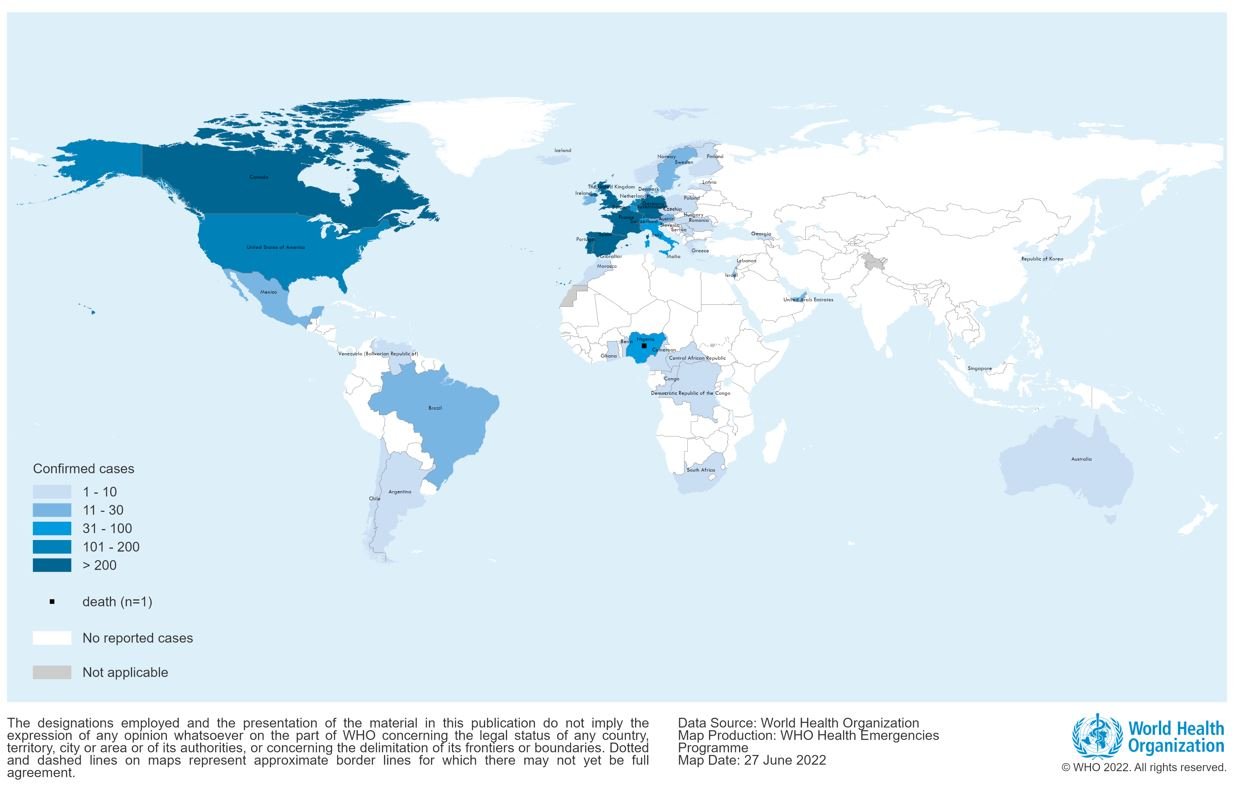
There are now 31,665 cases of monkeypox around the globe according to the latest data from the World Health Organisation.
Monkeypox is a rare viral infection that is endemic in Central or West Africa, but since May this year there has been a global increase in cases reported from non-endemic countries.
While Australia currently has 66 cases, including two in Western Australia, the outbreak has been more significant in the USA and Europe.
The USA currently reports 8,902 cases, while in Spain where the first cases outside of Africa were detected – there are 5162 cases.
Germany has 3025 cases, while the United Kingdom has reported 3017. There are 2423 cases in France and 2,293 cases in Brazil. Canada has 990, The Netherlands 959, Portugal 710 and Italy 599.
Cases have also been reported in over 70 other countries outside of the African nations where the virus is usually detected.
In the Asia Pacific region cases have been detected in Singapore, where there have been 15 cases. New Caledonia has reported a single case, while there have been three cases in New Zealand. There have been just three cases detected in China, Thailand and Japan both have four cases.
WA Health have adivsed that while the risk to the community from this cases detected in Western Australia are very low, returned travellers are being urged to monitor for symptoms of the virus.
The Communicable Disease Control Directorate’s Director, Dr Paul Armstrong said returned travellers, particularly from areas with high numbers of monkeypox cases, should remain vigilant for symptoms.
“We are asking the community to continue to be vigilant and watch for signs of the virus,” Dr Armstrong said.
“Monkeypox is spread to humans through close contact with an infected person, either by direct contact with open lesions or prolonged face to face contact, or with material contaminated with the virus.”
“A person with monkeypox can transmit the infection to other people through direct contact with skin lesions, or via respiratory droplets and contaminated materials such as bedding.”
“The initial symptoms of the illness may include flu-like symptoms such as fever or headache. A rash typically develops that appears as bumps, pimples or sores, and develops into fluid-filled lesions, pustules or ulcers. The rash can be widespread or localised to one area.”
“While the current overseas outbreak has disproportionately impacted men who have sex with men, anyone who has had close contact with a person with monkeypox is advised to self-monitor for symptoms.
“People who develop symptoms of monkeypox should isolate, wear a mask and contact their GP or a sexual health clinic, who can advise about testing for monkeypox.” Dr Armstrong said.
The World Health Organisation suspects the virus has most likely been spreading globally for some time.
“The unexpected appearance of monkeypox and the wide geographic spread of cases indicate that the monkeypox virus might have been circulating below levels detectable by the surveillance systems and sustained human-to-human transmission might have been undetected for a period of time.” the WHO said in it’s briefing notes on the virus.
The health authority has also highlighted that most of the cases have been atypical to the symptoms normally found in outbreaks in countries which usually experience the virus.
Many cases in newly-affected areas are not presenting with the classically described clinical picture for monkeypox (fever, swollen lymph nodes, followed by centrifugal rash).
Atypical features described include presentation of only a few or even just a single lesion, absence of skin lesions in some cases, with anal pain and bleeding and lesions in the genital or perineal/perianal area which do not spread further.
The most recent cases also include lesions appearing at different (asynchronous) stages of development and the appearance of lesions before the onset of fever, malaise and other constitutional symptoms.
OIP Staff
Do you need some support?
If you are struggling with anxiety or depression, support and counselling are available from:
QLife: 1800 184 527 / qlife.org.au (Webchat 3pm – midnight)
QLife are a counselling and referral service for LGBTQIA+ people.
DISCHARGED: info@discharged.org.au / discharged.org.au
Discharged is a trans-led support service with peer support groups for trans and gender diverse folks.
Lifeline: 13 11 14 / lifeline.org.au
Beyondblue: 1300 22 4636 / www.beyondblue.org.au





